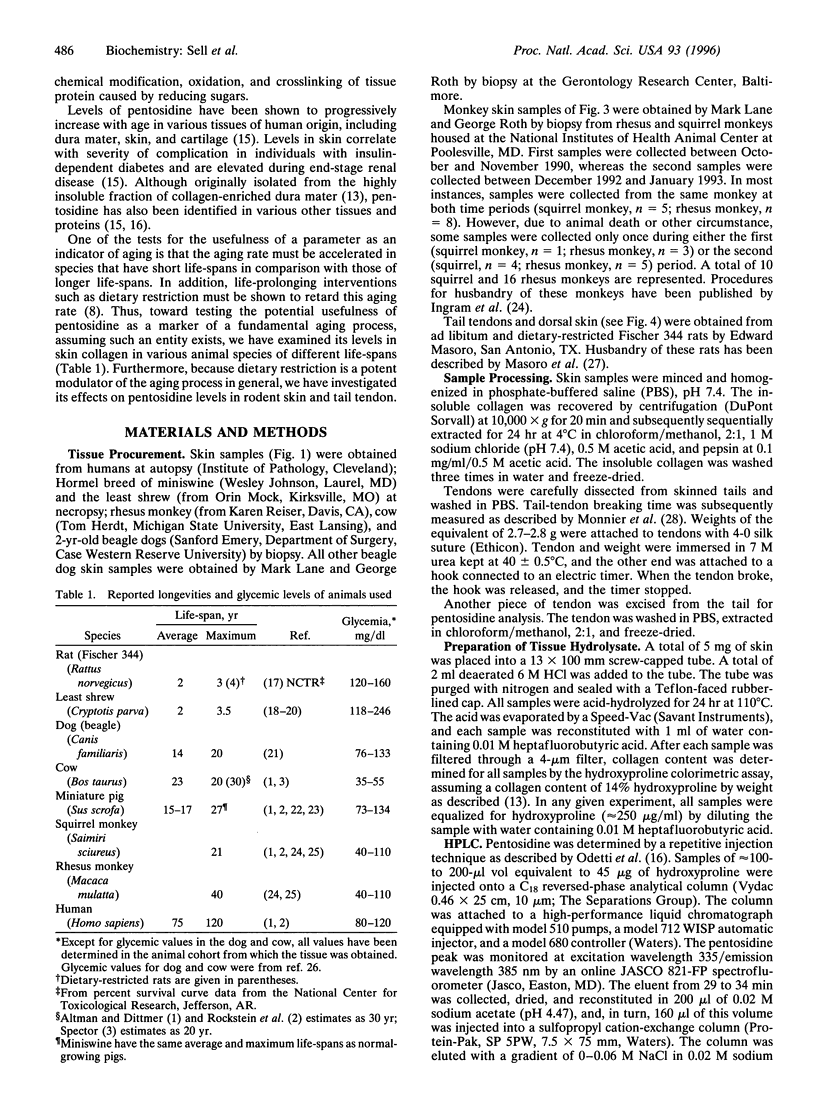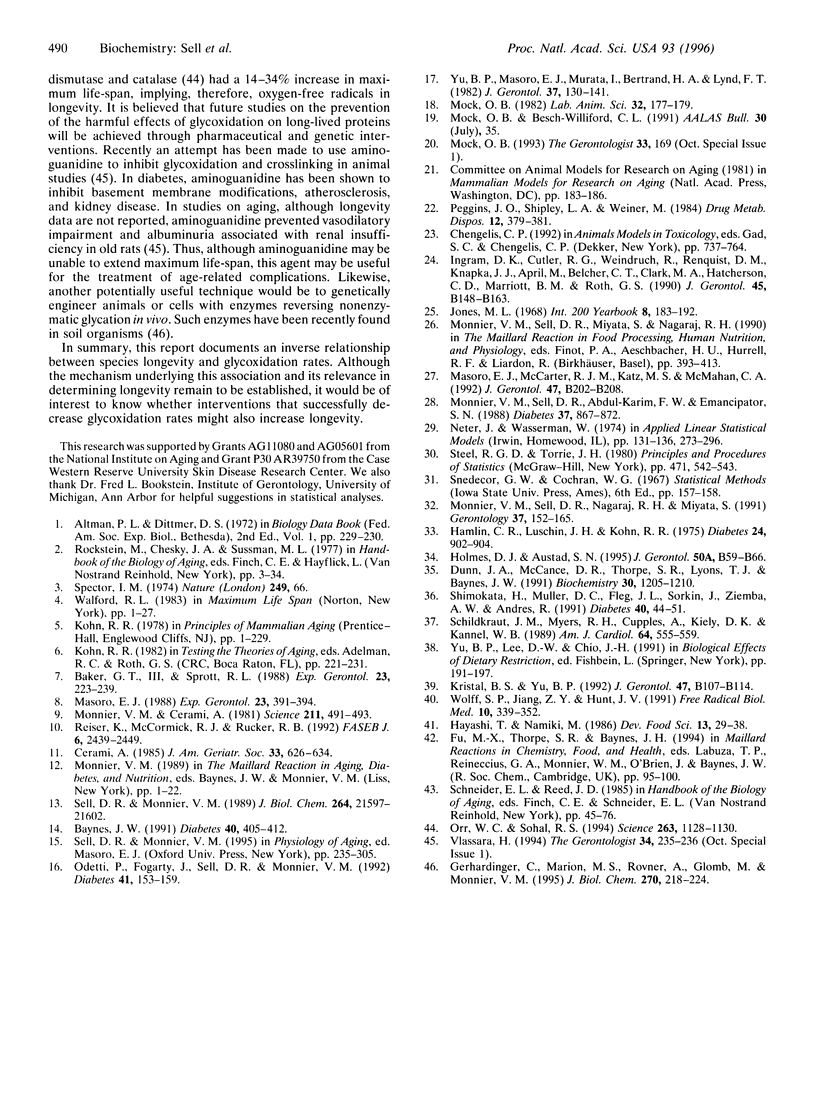Abstract
A fundamental question in the basic biology of aging is whether there is a universal aging process. If indeed such a process exists, one would expect that it develops at a higher rate in short- versus long-lived species. We have quantitated pentosidine, a marker of glycoxidative stress in skin collagen from eight mammalian species as a function of age. A curvilinear increase was modeled for all species, and the rate of increase correlated inversely with maximum life-span. Dietary restriction, a potent intervention associated with increased life-span, markedly inhibited glycoxidation rate in the rodent. On the assumption that collagen turnover rate is primarily influenced by the crosslinking due to glycoxidation, these results suggest that there is a progressive age-related deterioration of the process that controls the collagen glycoxidation rate. Thus, the ability to withstand damage due to glycoxidation and the Maillard reaction may be under genetic control.
Full text
PDF





Selected References
These references are in PubMed. This may not be the complete list of references from this article.
- Baker G. T., 3rd, Sprott R. L. Biomarkers of aging. Exp Gerontol. 1988;23(4-5):223–239. doi: 10.1016/0531-5565(88)90025-3. [DOI] [PubMed] [Google Scholar]
- Baynes J. W. Role of oxidative stress in development of complications in diabetes. Diabetes. 1991 Apr;40(4):405–412. doi: 10.2337/diab.40.4.405. [DOI] [PubMed] [Google Scholar]
- Cerami A. Hypothesis. Glucose as a mediator of aging. J Am Geriatr Soc. 1985 Sep;33(9):626–634. doi: 10.1111/j.1532-5415.1985.tb06319.x. [DOI] [PubMed] [Google Scholar]
- Dunn J. A., McCance D. R., Thorpe S. R., Lyons T. J., Baynes J. W. Age-dependent accumulation of N epsilon-(carboxymethyl)lysine and N epsilon-(carboxymethyl)hydroxylysine in human skin collagen. Biochemistry. 1991 Feb 5;30(5):1205–1210. doi: 10.1021/bi00219a007. [DOI] [PubMed] [Google Scholar]
- Gerhardinger C., Marion M. S., Rovner A., Glomb M., Monnier V. M. Novel degradation pathway of glycated amino acids into free fructosamine by a Pseudomonas sp. soil strain extract. J Biol Chem. 1995 Jan 6;270(1):218–224. doi: 10.1074/jbc.270.1.218. [DOI] [PubMed] [Google Scholar]
- Hamlin C. R., Kohn R. R., Luschin J. H. Apparent accelerated aging of human collagen in diabetes mellitus. Diabetes. 1975 Oct;24(10):902–904. doi: 10.2337/diab.24.10.902. [DOI] [PubMed] [Google Scholar]
- Holmes D. J., Austad S. N. Birds as animal models for the comparative biology of aging: a prospectus. J Gerontol A Biol Sci Med Sci. 1995 Mar;50(2):B59–B66. doi: 10.1093/gerona/50a.2.b59. [DOI] [PubMed] [Google Scholar]
- Ingram D. K., Cutler R. G., Weindruch R., Renquist D. M., Knapka J. J., April M., Belcher C. T., Clark M. A., Hatcherson C. D., Marriott B. M. Dietary restriction and aging: the initiation of a primate study. J Gerontol. 1990 Sep;45(5):B148–B163. doi: 10.1093/geronj/45.5.b148. [DOI] [PubMed] [Google Scholar]
- Kristal B. S., Yu B. P. An emerging hypothesis: synergistic induction of aging by free radicals and Maillard reactions. J Gerontol. 1992 Jul;47(4):B107–B114. doi: 10.1093/geronj/47.4.b107. [DOI] [PubMed] [Google Scholar]
- Masoro E. J., McCarter R. J., Katz M. S., McMahan C. A. Dietary restriction alters characteristics of glucose fuel use. J Gerontol. 1992 Nov;47(6):B202–B208. doi: 10.1093/geronj/47.6.b202. [DOI] [PubMed] [Google Scholar]
- Masoro E. J. Physiological system markers of aging. Exp Gerontol. 1988;23(4-5):391–397. doi: 10.1016/0531-5565(88)90043-5. [DOI] [PubMed] [Google Scholar]
- Mock O. B. The least shrew (Cryptotis parva) as a laboratory animal. Lab Anim Sci. 1982 Apr;32(2):177–179. [PubMed] [Google Scholar]
- Monnier V. M., Cerami A. Nonenzymatic browning in vivo: possible process for aging of long-lived proteins. Science. 1981 Jan 30;211(4481):491–493. doi: 10.1126/science.6779377. [DOI] [PubMed] [Google Scholar]
- Monnier V. M., Sell D. R., Abdul-Karim F. W., Emancipator S. N. Collagen browning and cross-linking are increased in chronic experimental hyperglycemia. Relevance to diabetes and aging. Diabetes. 1988 Jul;37(7):867–872. doi: 10.2337/diab.37.7.867. [DOI] [PubMed] [Google Scholar]
- Monnier V. M., Sell D. R., Nagaraj R. H., Miyata S. Mechanisms of protection against damage mediated by the Maillard reaction in aging. Gerontology. 1991;37(1-3):152–165. doi: 10.1159/000213256. [DOI] [PubMed] [Google Scholar]
- Odetti P., Fogarty J., Sell D. R., Monnier V. M. Chromatographic quantitation of plasma and erythrocyte pentosidine in diabetic and uremic subjects. Diabetes. 1992 Feb;41(2):153–159. doi: 10.2337/diab.41.2.153. [DOI] [PubMed] [Google Scholar]
- Orr W. C., Sohal R. S. Extension of life-span by overexpression of superoxide dismutase and catalase in Drosophila melanogaster. Science. 1994 Feb 25;263(5150):1128–1130. doi: 10.1126/science.8108730. [DOI] [PubMed] [Google Scholar]
- Peggins J. O., Shipley L. A., Weiner M. Characterization of age-related changes in hepatic drug metabolism in miniature swine. Drug Metab Dispos. 1984 May-Jun;12(3):379–381. [PubMed] [Google Scholar]
- Reiser K., McCormick R. J., Rucker R. B. Enzymatic and nonenzymatic cross-linking of collagen and elastin. FASEB J. 1992 Apr;6(7):2439–2449. doi: 10.1096/fasebj.6.7.1348714. [DOI] [PubMed] [Google Scholar]
- Schildkraut J. M., Myers R. H., Cupples L. A., Kiely D. K., Kannel W. B. Coronary risk associated with age and sex of parental heart disease in the Framingham Study. Am J Cardiol. 1989 Sep 15;64(10):555–559. doi: 10.1016/0002-9149(89)90477-3. [DOI] [PubMed] [Google Scholar]
- Sell D. R., Monnier V. M. Structure elucidation of a senescence cross-link from human extracellular matrix. Implication of pentoses in the aging process. J Biol Chem. 1989 Dec 25;264(36):21597–21602. [PubMed] [Google Scholar]
- Shimokata H., Muller D. C., Fleg J. L., Sorkin J., Ziemba A. W., Andres R. Age as independent determinant of glucose tolerance. Diabetes. 1991 Jan;40(1):44–51. doi: 10.2337/diab.40.1.44. [DOI] [PubMed] [Google Scholar]
- Spector I. M. Animal longevity and protein turnover rate. Nature. 1974 May 3;249(452):66–66. doi: 10.1038/249066a0. [DOI] [PubMed] [Google Scholar]
- Wolff S. P., Jiang Z. Y., Hunt J. V. Protein glycation and oxidative stress in diabetes mellitus and ageing. Free Radic Biol Med. 1991;10(5):339–352. doi: 10.1016/0891-5849(91)90040-a. [DOI] [PubMed] [Google Scholar]
- Yu B. P., Masoro E. J., Murata I., Bertrand H. A., Lynd F. T. Life span study of SPF Fischer 344 male rats fed ad libitum or restricted diets: longevity, growth, lean body mass and disease. J Gerontol. 1982 Mar;37(2):130–141. doi: 10.1093/geronj/37.2.130. [DOI] [PubMed] [Google Scholar]


